
What is assertiveness?
It is a way of relating with others, knowing and defending our rights or point of view, but with respect towards others. Said like this it seems very clear. But in practice we can have problems with some aspect. Be it knowing our rights; be it daring to defend our rights or opinions; or be it doing so with respect and good manners.
On which side if the scale are you?
Depending on our character, level of self-confidence and communication skills, we face potentially conflicting situations in a certain way. But it may also depend on the situation and surrounding. We might not have trouble requesting something because there is not much at stake or because it is for a good cause. But when it comes to saying “no” to a colleague or your boss or even asking for a raise for example, assertiveness can desert us.
Assertiveness is the happy medium between passivity and aggressiveness. And as said before the balance can tilt to one side or the other.
Passivity
On this side we find people who do not defend their opinion or rights due to a lack of knowledge, insecurity or fear. They do not dare to say “no” to things that they do not like, invade their intimate space, are against their values or detrimental to their productivity or good work.
Aggressiveness
On the other side of the balance we find people who impose their opinion. They defend their rights but without respecting others. They are convincing but seem hard or even rude. A strong character and temperament lead them to not being afraid of saying “no”. But the other person can feel hurt in his/her feeling or as if he/she had been run over.
What does being assertive mean then?
To me it means relating with others without walking over them or being walked over. It is about making clear our point of view and feelings politely. Applied to the world of work, where the concept is a buzzword, it also means ensuring your work and time are respected. With that I want to say that I consider important to learn to react so we do neither fall into the extreme of putting our head down saying “yes” to everything, at the risk of overburdening ourselves, nor offending other people by responding rudely.
The components of an assertive and effective conversation
An assertive conversation characterises by saying what we think and feel with regard to a situation. Also, it means saying it to the appropriate person in the suitable moment and context. All this with utmost respect and the awareness that it will have an impact on the other person; but also without feeling guilty about expressing our opinion and feelings.
Therefore, we describe the situation, what emotions it produce to us and what think about it. Then we explain how we would like to solve the situation. Finally we ask the other person what they think and what they will do about it.
To put an example, think of a colleague who is usually late for your meetings. The passive reaction would be to not say anything but feel irritated. The aggressive way could be to say “Late again?” in front of everybody or tell him/her afterwards “Why do you always have to be late?”.
Now, the assertive way would be to approach the person alone after the meeting and say: “This is not the first time you arrive late to a meeting and it irritates me because I feel that you do not seem to consider the meeting important and I personally find it disrespectful of the other attendants. Therefore I would really appreciate it if you could try to be on time next time or notify me if you are going to be late. What do think?”
What to do when they catch us unaware?
However, assertiveness is also required in situations which might not be ideal because we are caught off guard and interrupted in our work. Nonetheless, even in these situations where we want to claim respect for our work and time, we can treat the other person with respect and good manners.
Thence it is useful to speak from the “I”, expressing our feelings. Because that way we are not blaming the other, thus putting him/her on the defensive, but making him/her see how the situation affects us. However remember not only to explain what you feel but also to state how you would like to solve the problem.
Earlier I said that our reaction is influenced by our way of being and the resources we have to face a situation. Therefore let us see in the following some additional tricks depending on which side of the scale you tend to.
Tricks if you tend towards aggressiveness
When we react in an impatient, abrupt, rude or aggressive way, we can hurt others’ feelings. As well as hurting your relationship with that person, you will probably feel guilty and have a bad conscience after your outburst.
For this reason, I suggest that, when faced with a stressful or conflicting situation, you take a moment to breathe deeply. This will give you an instant to think about the reply and look for a way to express yourself politely and respectfully.
Know yourself better
Beyond the immediate situation, I suggest you analyse the source of your impatience or aggressiveness. In order to get to know yourself better and train your patience, I propose the practice of Mindfulness or contemplation. Personally it has worked for me. Also check your level of stress and the need to incorporate into your routine relief techniques.
Furthermore I suggest you check your level of empathy. It is very well to defend our rights but it should not be at other people’s expense. Therefore, knowing to recognise and understand what others feel and why they behave in a certain way, can help us react more respectfully.
Tricks if you tend towards passivity
When the balance tips towards the other side, that is passivity, it is more likely that we direct our feelings of discomfort or anger towards ourselves. After letting us be persuaded again of something we did not want, or having missed another opportunity to share our opinion, we possibly tell ourselves off for having let us being “trampled” on.
I believe the solution is working our self-esteem on one hand and analysing what scares us about expressing our opinion or feelings on the other hand. Even put yourself into the position of thinking what is the worst that could have happened in a certain situation if you had defended your rights and opinion.
Train your assertiveness with little experiments
In order to improve your assertiveness, it can be could idea to practice in situations of little importance. You do not dare to return a meal you do not like in a restaurant? Next time ask them to change it. If you will pay for it anyway, the only one disturbed by not saying anything will be you.
Somebody jumps the queue in the supermarket and you usually let it go? You possibly try to convince yourself that it is not a big deal. But inside you will be cross and grumbling. So next time try and tell the person politely that you think you were first. And do not be frightened if the person reacts rudely. You do not know him/her and probably will not see him/her again. Just remember the feeling of having dared to say something.
These little experiments can train you for more important situations.
When it comes to more important conversations, I suggest you practice the dialogue. If you can do it with a person of trust, much better. Try to think of all possible replies you might receive in order to prepare the appropriate arguments.
Look for the happy medium of assertiveness in your conversations
I hope these tricks help you train your assertiveness.
Are you assertive in your day to day? Does it depend on the situation? In which situation do you have more trouble being assertive and why do you think it is like that?

Sharing is caring!




